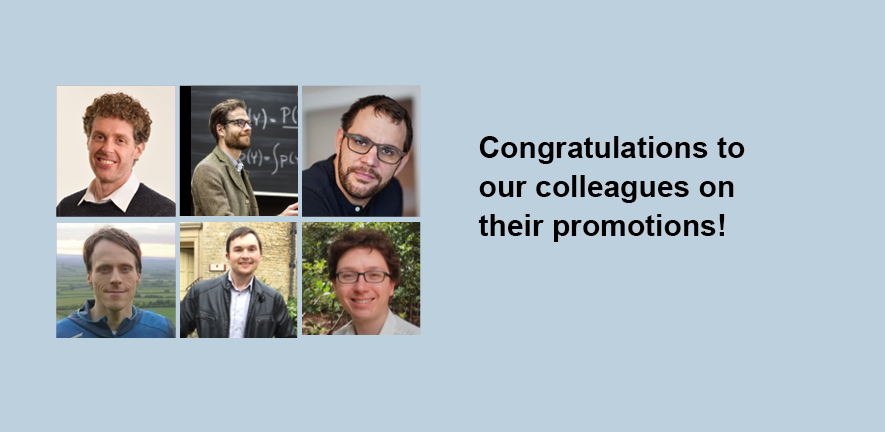
Submitted by Rachel Gardner on Wed, 12/06/2024 - 17:38
Congratulations to the six members of this Department who have been promoted as Professor!
Every year, the University runs a rigorous and competitive Senior Academic Promotion process. We are delighted that at the end of the 2023-24 process, six of our colleagues have been promoted. They are Nic Lane, Jamie Vicary, Thomas Sauerwald, Carl Henrik Ek, Tom Gur and Ferenc Huszár.
Dr Carl Henrik Ek has been promoted from Associate Professor to Professor.
Carl Henrik is a member of our Machine Learning and Artificial Intelligence group where researchers aim to understand, represent, model, learn and reason about problems in the real world and to build AI technologies that benefit society and increase social awareness.
As a Senior Lecturer here, Carl Henrik has developed new courses at both undergraduate and master’s level that combine advanced machine learning and statistics with real-world problems. They are highly innovative in content, delivery and assessment and were this year recognised with a Pilkington Prize – an award made by the University of Cambridge for excellence in teaching.
He has also been successful in gaining UKRI funding for a new Centre for Doctoral Training in collaboration with the University of Manchester, on Decision Making for Complex Systems.
Dr Tom Gur has been promoted from Associate Professor to Professor.
Tom, who joined us as a new member of our faculty last summer, is a member of the Algorithms and Complexity and Quantum Computing research groups here.
His research is in Theoretical Computer Science and Quantum Computing. More specifically, his work is predominantly in Classical and Quantum Algorithms and Complexity Theory, as well as in Learning Theory, Coding Theory, and Cryptography. Tom is particularly fascinated by how quantum mechanical phenomena can shed light on the nature of computation, and how the lens of complexity theory can provide new insight into the nature of the universe.
Also promoted from Associate Professor to Professor is Dr Ferenc Huszár.
Ferenc is interested in the principles of machine learning, with a particular focus on modern deep learning methods. His research falls into the following themes: Optimization, Generalization and Transferability in Deep Learning; Mathematical Models of Emergent Behaviours; Unsupervised Representation Learning; Probabilistic foundations; and Causal Inference and Identifiability.
In addition to his role here, Ferenc also runs AI retreats for high-school students in Hungary and has set up a scholarship fund for talented students from Ukraine.
There is also a Professorial promotion for Nic Lane, Professor of Machine Learning Systems here.
Nic studies the design, architecture and algorithms of scalable and robust end-to-end machine learning (ML) systems. His research interests drive towards the development of new forms of ML systems that are revolutionary in how they leverage multi-modal data (such as speech, vision, location, inertial information) to infer and reason over complex real-world situations, while simultaneously maintaining extreme levels of systems flexibility (eg distributed execution, adaptation) and efficiency (eg compute, memory).
Nic holds a prestigious Royal Academy of Engineering Chair in Emerging Technologies, which was awarded for his work to make the development of AI more democratic. His 10-year project DANTE aims to encourage wider and more active participation across society in the development and adoption of even the most advanced AI techniques.
Nic is also the co-founder of Flower, a federated learning network. Last year, Flower won Product of the Year at our Hall of Fame Awards.
Thomas Sauerwald, a Deputy Head of this Department, is another colleague to be receiving a Professorial promotion.
A Professor in Algorithms and Probability, Thomas is a member of our Algorithms and Complexity and Machine Learning and Artificial Intelligence research groups.
He has formerly held a European Research Council (ERC) Starting Grant for his work in exploring new algorithms based on multiple random walks that are able to cope with massive and complex data sets.
Also receiving a Professorial promotion is Jamie Vicary.
Jamie is a Professor of Future Computation and a Royal Society University Research Fellow. His research aims to develop new logical and structural techniques, with the goal of transforming the way we compute in the future, across a range of areas including quantum and classical computation.
A lot of his research uses the tools of category theory, a rich abstract language for understanding how interacting systems process information. Jamie is also interested in studying category theory itself, finding ways to make it more powerful and easier to use. He works as part of the Cambridge Logical Structures Hub (CLASH) research group in the department.

